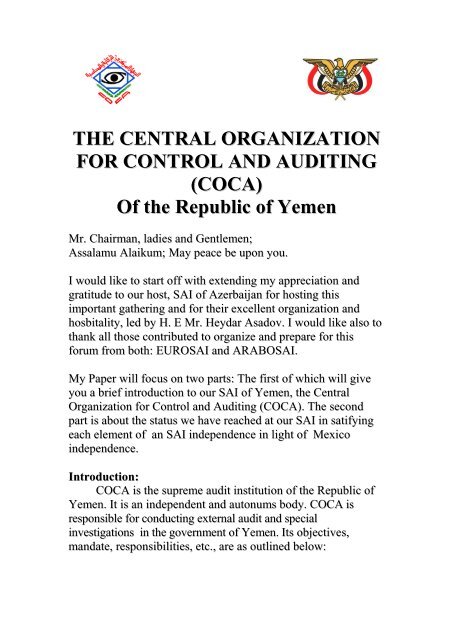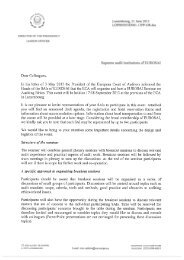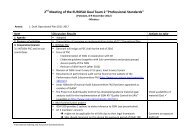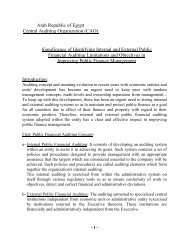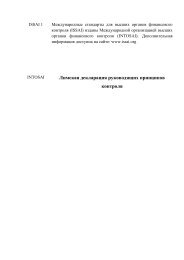COCA - Eurosai
COCA - Eurosai
COCA - Eurosai
You also want an ePaper? Increase the reach of your titles
YUMPU automatically turns print PDFs into web optimized ePapers that Google loves.
THE CENTRAL ORGANIZATION<br />
FOR CONTROL AND AUDITING<br />
(<strong>COCA</strong>)<br />
Of the Republic of Yemen<br />
Mr. Chairman, ladies and Gentlemen;<br />
Assalamu Alaikum; May peace be upon you.<br />
I would like to start off with extending my appreciation and<br />
gratitude to our host, SAI of Azerbaijan for hosting this<br />
important gathering and for their excellent organization and<br />
hosbitality, led by H. E Mr. Heydar Asadov. I would like also to<br />
thank all those contributed to organize and prepare for this<br />
forum from both: EUROSAI and ARABOSAI.<br />
My Paper will focus on two parts: The first of which will give<br />
you a brief introduction to our SAI of Yemen, the Central<br />
Organization for Control and Auditing (<strong>COCA</strong>). The second<br />
part is about the status we have reached at our SAI in satifying<br />
each element of an SAI independence in light of Mexico<br />
independence.<br />
Introduction:<br />
<strong>COCA</strong> is the supreme audit institution of the Republic of<br />
Yemen. It is an independent and autonums body. <strong>COCA</strong> is<br />
responsible for conducting external audit and special<br />
investigations in the government of Yemen. Its objectives,<br />
mandate, responsibilities, etc., are as outlined below:
Objectives<br />
The objectives of <strong>COCA</strong> as stated in its Act (1992) are<br />
summarized as to:<br />
1. carry out effective audit to ensure sufficient and adequate<br />
management and uses of public funds and resources with<br />
due regard to economy, efficiency and effectiveness;<br />
2. contribute to enhance and improve performance of public<br />
entities; and<br />
3. contribute to the development of auditing and accounting<br />
profession in Yemen.<br />
In other words, as a Supreme Audit Institution, <strong>COCA</strong> is<br />
concerned with the overall public financial management in<br />
Yemen. Its ultimate mission is the assurance that all public<br />
funds and expenditures are adequately controlled, accounted for,<br />
safeguarded and used with due regards to economy, efficiency<br />
and effectiveness.<br />
Types of Audit<br />
<strong>COCA</strong> is empowered to conduct, but not limited to, the<br />
following types of audit:<br />
1. compliance/authority audit; attest/financial, and<br />
2. performance (value-for-money) audit. <strong>COCA</strong> has the<br />
freedom to plan for its audits as it sees fit with due regard<br />
to its resources and competencies. Regularly, in addition to<br />
its annual audit plan, it performs a number of special<br />
assignments as deems necessary in response to special<br />
requests from high authorities (Parliament, President,<br />
Prime Minister).<br />
Reporting Responsibilities
As per its law of 1992, Our organization, <strong>COCA</strong>, is reporting to<br />
the President of the Republic of Yemen and the Parliament.<br />
Accordingly, <strong>COCA</strong> is required to issue three layers of reports :<br />
Audit reports issued to the concerned entities with copies<br />
to the Presidential Office, Prime Minister, and any related<br />
supervisory parties as the case might be; and<br />
Periodic/quarterly and annual reports to be submitted to<br />
the President, Parliament and Ashura Council<br />
(Consultative Council of the Republic of Yemen); and<br />
<strong>COCA</strong> audit report of the Final Accounts of the State of<br />
Yemen to be submitted directly to the Parliament.<br />
Though <strong>COCA</strong> is required by law to conduct three main kinds<br />
of auditing, financial, compliance and performance auditing,<br />
currently its main focus is on financial and compliance audits. It<br />
is in the process of developing its capabilities and resources to<br />
effectively undertake comprehensive auditing, thereby fulfilling<br />
its mandate.<br />
Scope of Work:<br />
In its work, <strong>COCA</strong> covers all public entities, authorities, public<br />
enterprises, semi-public enterprises and subsidized units<br />
including Cooperatives. So, in that capacity, <strong>COCA</strong> follows the<br />
public moneys wherever it goes.
<strong>COCA</strong> adherence to the eight core principles of SAI<br />
independence proclaimed in the Mexico Declaration on SAI<br />
Independence (ISSAI 10)<br />
Principle 1<br />
The existence of an appropriate and effective<br />
constitutional/statutory/legal framework and of de<br />
facto application provisions of this framework<br />
In general there is a Legislation that spells out, in detail; the<br />
extent of our SAI independence. According to <strong>COCA</strong> Act<br />
of 1992, our organization is an autonomous and<br />
independent body. It is financially and administratively<br />
independent. The president of <strong>COCA</strong> has the powers of<br />
the Ministers of Finance and Civil Service in managing the<br />
organization resources. The budget of <strong>COCA</strong> is included<br />
in the General Budget of the State as a number. Thereby<br />
the Ministry of Finance is not allowed to change the<br />
budget of our SAI. It has all the powers to plan, conduct<br />
and follow-up its work the way it sees fit.<br />
Recently, <strong>COCA</strong> has proposed a constitutional amendment to<br />
recognize <strong>COCA</strong> as an autonomous supreme audit<br />
institution of Yemen to ensure constitutional foundation of<br />
independence to our SAI. In the current constitution, there<br />
is one provision requiring an audit body to submit its<br />
annual auditor report about the state final accounts to the<br />
parliament. Its independence is not expressed clearly and<br />
directly.
Principle 2<br />
The independence of SAI heads and members (of collegial<br />
institutions), including security of tenure and legal immunity<br />
in the normal discharge of their duties<br />
The current applicable legislation does not specify clearly the<br />
conditions for appointments, re-appointments, employment,<br />
removal and retirement of the head of our SAI. However, our<br />
organization is in the process of amending the current legislature<br />
to secure more independence. That would include the<br />
appointment and re-appointment of the president of <strong>COCA</strong> for a<br />
fixed term of five years renewable only once. Moreover, the<br />
appointment process is involving the President of the Republic<br />
and the Parliament.<br />
Principle 3<br />
A sufficiently broad mandate and full discretion, in the<br />
discharge of SAI functions<br />
Our SAI is empowered to conduct all types of audits<br />
(financial, compliance and performance)…The scope of its<br />
audit includes, among other things, the:<br />
• Use of public monies, resources, or assets, by a recipient or<br />
beneficiary regardless of its legal nature;<br />
• Collection of revenues owed to the government or public<br />
entities;<br />
• Legality and regularity of government or public entities<br />
accounts;<br />
• Quality of financial management and reporting; and
• Economy, efficiency, and effectiveness of government or<br />
public entities operations.<br />
While respecting the laws enacted by the Legislature that apply<br />
to our SAI, it is free from direction or interference from the<br />
Legislature or the Executives in conducting its mandate, i.e. in<br />
the:<br />
• Selection of audit issues;<br />
• Planning, programming, conducting, reporting, and follow-up<br />
of its audits;<br />
• Organization and management of the office; and<br />
• Enforcement of the decisions, conclusions and/or<br />
recommendations wherever is applicable.<br />
Principle 4<br />
Unrestricted access to information<br />
As clearly specified by its law, our SAI, <strong>COCA</strong> has adequate<br />
powers to obtain timely, unfettered, direct, and free access to all<br />
the necessary documents and information, for the proper<br />
discharge of its statutory responsibilities. Any kind of delay to<br />
obtain the necessary information or obstacle is considered as a<br />
punishable act.<br />
Principle 5<br />
The right and obligation to report on their work<br />
Our organization is not restricted from reporting the results of its<br />
audit work. It is required by the constitution to report at least<br />
once a year on the results of their audit work of the final<br />
accounts of the state budget. Also, it is required by law to report<br />
quarterly on its audit work in addition to individual audit reports<br />
that are addressed to the entities subject to its audit with copies<br />
to their respective supervisory bodies.<br />
Principle 6
The freedom to decide the content and timing of audit<br />
reports and to publish and disseminate them<br />
<strong>COCA</strong> is free to decide the content of its audit reports. It is also<br />
free to make observations and recommendations in their audit<br />
reports, taking into consideration, as appropriate, the views of<br />
the audited entity. As mentioned previously, <strong>COCA</strong> is<br />
specifically required by the constitution to submit its audit<br />
report of the Final Accounts of the State Budget to the<br />
Parliament. The report is distributed to all members of the<br />
parliament and openly discussed and broadcasted live on<br />
television and Radio.<br />
<strong>COCA</strong> is free to decide on the timing of its audit reports with<br />
regard to the individual audit reports to be addressed to the<br />
entities subject to its audits. As with regard to quarterly or<br />
annual reports, they are to be issued in the specified time as<br />
prescribed by the constitution or law.<br />
<strong>COCA</strong>, sometimes, accommodates specific requests for<br />
investigations or audits by the Legislature, as a whole, or one of<br />
its commissions, or the President of the Republic or the Prime<br />
Minister as it sees fit.
Our SAI issues quarterly statistical report describing a summary<br />
of its audits in General terms for it is not totally free to publish<br />
and disseminate its audit reports, except for those that have been<br />
formally tabled or delivered to the Parliament. That is because<br />
there is no legislation prescribes these cases for all government<br />
entities not only our organization. In order for <strong>COCA</strong> to make<br />
its reports public, there is a need for a governing legislation<br />
prescribing what should be secret/classified and<br />
public/unclassified information; in some countries it is called<br />
secrecy and disclosure/ transparency act.<br />
Principle 7<br />
The existence of effective follow-up mechanisms on SAI<br />
recommendations<br />
<strong>COCA</strong> submits its reports to the Parliament, President, Alshura<br />
(consultative) Council, Prime Minister, Supervisory bodies<br />
and/or head of the audited entities as appropriate, for review and<br />
follow-up on specific recommendations for corrective action.<br />
<strong>COCA</strong> has its own internal follow-up system to ensure that the<br />
audited entities properly address its observations and<br />
recommendations as well as those made by the Parliament, or<br />
one of its commissions, and the President of the Republic of<br />
Yemen, as appropriate. <strong>COCA</strong> includes its follow-up findings in<br />
its subsequent audit reports to be addressed to different levels of<br />
stockholders (Parliament, President, Prime Minister,<br />
Supervisory Bodies, Head of agencies etc...) as it sees fit, for<br />
consideration and action.<br />
Principle 8<br />
Financial and managerial/administrative autonomy and the<br />
availability of appropriate human, material, and monetary<br />
resources<br />
To a certain extent we could say that our SAI has available<br />
necessary and reasonable human, material, and monetary<br />
resources. Our law specifies that <strong>COCA</strong> Budget should be
included as one single number in the state budget without any<br />
unnecessary interference of the executives. Furthermore,<br />
though the president of <strong>COCA</strong> has the powers of the ministers<br />
of Civil Service and Finance, our organization is still straggling<br />
in securing more sufficient resources free of executive control<br />
on the access to these resources. However, our SAI manages its<br />
own appropriated budget and allocate it appropriately. In our<br />
country, the problem we are facing is that the executive branch<br />
is responsible to submit the state budget to the Parliament in<br />
which <strong>COCA</strong> budget is included. The parliament has the power<br />
to propose recommendations to the government to apply any<br />
changes in the budget but not to apply changes itself. For that<br />
reason <strong>COCA</strong> can not apply to the legislature for any additional<br />
resources to help it fulfill its mandate.<br />
In closing:<br />
I would like to express my heartfelt appreciation and<br />
gratitude for giving me this wonderful opportunity to share<br />
with you our experiences and practices in executing our<br />
mandate within the context of our independence in this<br />
valuable and fruitful gathering. I am very confident that we<br />
will benefit a great deal from the exchange of the valuable<br />
information, good practices from both sides- EUROSAI and<br />
ARABOSAI. As I had previously positive experiences from<br />
similar forums, I am equally confident that outcome of this<br />
meeting would be fruitful and everlasting impact on suborganizations<br />
and respective SAIs. Our host, the SAI of<br />
Azerbaijan, is one of the main factors of success due its<br />
unique capabilities to organize such well rewarding event.<br />
Thanks to the Control Chamber of Azerbaijan for their<br />
warm hospitality.<br />
Thank You very much for your kind attention.<br />
Assalamu Alaikum


